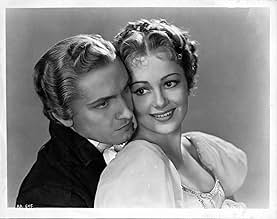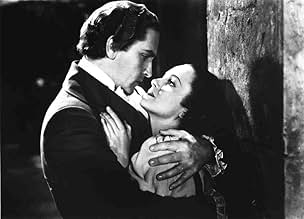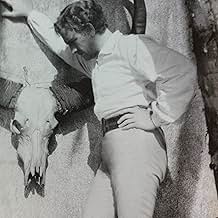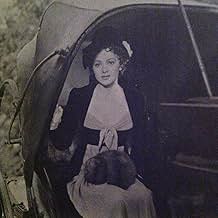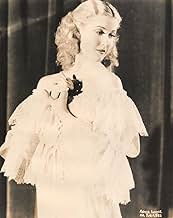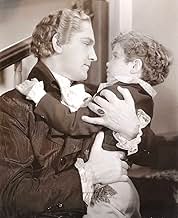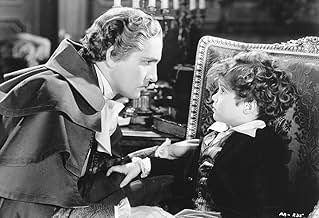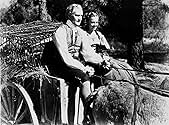IMDb RATING
6.3/10
2.1K
YOUR RATING
In 18th-century Italy, an orphan's debt to the man who raised him threatens to separate him forever from the woman he loves.In 18th-century Italy, an orphan's debt to the man who raised him threatens to separate him forever from the woman he loves.In 18th-century Italy, an orphan's debt to the man who raised him threatens to separate him forever from the woman he loves.
- Won 4 Oscars
- 8 wins & 3 nominations total
Featured reviews
Hervey Allen (1889-1949) spun quite an elaborate, sweeping 18th-19th century yarn in the form of a gigantic novel, published in 1933, called "Anthony Adverse." It became a best-seller, and three years later Warner Bros. brought it to the screen, directed by Mervyn LeRoy.
The film was very long, comprehensive, and romanitc, in Allen's quasi-Dumas-Dickens-Tolstoy style.
Heading the cast were four of the screen's finest actors, leading players Fredric March and Olivia de Havilland; and supporting character players Claude Rains and Gale Sondergaard.
Providing the musical score was the legendary Eric Wolfgang Korngold (with orchestrations by Hugo Friedhofer) and classic masque and operatic excerpts by Monteverdi and Francetti.
The 141-minute film today seems much longer than it is, as we follow Anthony's detailed "adventures" in Europe, Cuba, and Africa, with America targeted as a final future destination. The whole production, which was considered of blockbuster size in 1933 (and still looks impressive), emerges more like a historic relic that is occasionally pulled from a treasure cabinet, to observe and ponder.
The whole feel of the film now seems dated and out-of-fashion, but then that's what most memorabilia is. It's merely dusted it off, polished, felt for the moment, then replaced along side other treasured pieces from the past.
The film was very long, comprehensive, and romanitc, in Allen's quasi-Dumas-Dickens-Tolstoy style.
Heading the cast were four of the screen's finest actors, leading players Fredric March and Olivia de Havilland; and supporting character players Claude Rains and Gale Sondergaard.
Providing the musical score was the legendary Eric Wolfgang Korngold (with orchestrations by Hugo Friedhofer) and classic masque and operatic excerpts by Monteverdi and Francetti.
The 141-minute film today seems much longer than it is, as we follow Anthony's detailed "adventures" in Europe, Cuba, and Africa, with America targeted as a final future destination. The whole production, which was considered of blockbuster size in 1933 (and still looks impressive), emerges more like a historic relic that is occasionally pulled from a treasure cabinet, to observe and ponder.
The whole feel of the film now seems dated and out-of-fashion, but then that's what most memorabilia is. It's merely dusted it off, polished, felt for the moment, then replaced along side other treasured pieces from the past.
Fredric March stars as the title character, an orphan boy discarded due to his illegitimacy, who overcomes much adversity throughout his life. He is raised in a convent and adopted by a wealthy merchant, Edmund Gwenn, at the age of ten. He learns the business, but is shipped to Havana around the time of the French Revolution. Before he departs, it is learned that he has married the daughter of a servant, Olivia DeHavilland. He is thought lost at sea by all, but is actually in Africa running a slave trade, with his heart blackening the whole time. From there, the tale takes many twists as Anthony must find goodness in his heart again, and DeHavilland may be the key. The drama is a bit heavy-handed and some overacting is present. Claude Rains and Gale Sondergaard make great antagonists, and Sondergaard won a Best Supporting Actress Oscar for her performance.
Wrongheaded critics:
There are more than one user reviews posted here including one that says the film should get zero stars because it deals with slavery. I think such an attitude about a movie that was made at any time let alone the 1930s is absurd. Are they supposed to pretend that slavery in the 1700s somehow did not exist and that many many people were involved in this trade? It's idiotic. The film clearly shows that there were those risking their lives in opposition to the slave trade and that there were others who were corrupted by the wealth and power that they gained from it. So to those pretentious and moralistic critics, I say get off your self righteous high horse and look at this film and all others in its proper historical context.
I just watched the Warner Archive DVD-R of this movie last night. I want to say that it is a good movie and much underrated by the IMDb score of 6.6. It deserves at least a 7.6; I give it an 8.
It is beautifully filmed, the sets are gorgeous, and the cast of actors is stellar and does a good job with the material. Even the players with smaller roles are well-known actors, and they deliver their short moments with just the right emphasis. If you're an old film fan, you can't watch the movie without seeing a score of faces that you know and love.
The two main complaints I see here are that Fredric March is too old to play a convincing lover for De Havilland, and that the movie is somewhat pedestrian and dragging.
On the first point, yes, in some scenes the age difference in visible, but in others, March is made up to look younger than his biological age, and is convincing as a younger man. But the key thing is that March is *good* in the role. If you overlook the physical signs of his age, and concentrate on his characterization, delivery, etc., you can see he is acting thoughtfully, trying to do justice to his complex character. I think it's an excellent performance.
Pedestrian and dragged-out? Well, the film is long, as these epic-type films tend to be. Yet I did not find that my interest flagged. The film deals with years of the lives of these characters, and it needs to be long to get in all the complex background of European history and the changes in the lives of the characters (not to mention the important back-story of Anthony's birth).
One more thing: some commenters thought that Gale Sondergaard did little to earn her Oscar for this one. I thought she was very good. Normally she plays the sinister villainess in a very broad manner that telegraphs how evil and sinister she is; in fact, she was often hired because she was so good at that kind of thing (see her many Universal horror and mystery films). Here, she shows a bit of that sinister character, but underplays it greatly, to very good effect. She would never have earned an Oscar had she played the role in her heavy Universal style. I think it's the subtlest performance I've seen her give.
The sound on the Archives DVD-R is at first a tiny bit harsh, especially the booming orchestra with the grand Korngold score; this I noticed especially near the beginning of the film, and was worried it would spoil the film for me. However, the sound seemed to become a bit gentler about 10 or 15 minutes into the movie -- or maybe I just got used to it. But the volume of characters's speeches was definitely a bit uneven in the first few minutes. That happens, with movies this old. Perfect prints are rare, and DVDs reflect the imperfections. Overall, however, the DVD was quite watchable and the audio was clear and adequate.
I recommend this as a historical epic. Not one the greatest epics, to be sure, but quite a good one, and admirably executed. Maybe not a must-see, but certainly nothing you will regret seeing. I will watch it more than once, I think.
It is beautifully filmed, the sets are gorgeous, and the cast of actors is stellar and does a good job with the material. Even the players with smaller roles are well-known actors, and they deliver their short moments with just the right emphasis. If you're an old film fan, you can't watch the movie without seeing a score of faces that you know and love.
The two main complaints I see here are that Fredric March is too old to play a convincing lover for De Havilland, and that the movie is somewhat pedestrian and dragging.
On the first point, yes, in some scenes the age difference in visible, but in others, March is made up to look younger than his biological age, and is convincing as a younger man. But the key thing is that March is *good* in the role. If you overlook the physical signs of his age, and concentrate on his characterization, delivery, etc., you can see he is acting thoughtfully, trying to do justice to his complex character. I think it's an excellent performance.
Pedestrian and dragged-out? Well, the film is long, as these epic-type films tend to be. Yet I did not find that my interest flagged. The film deals with years of the lives of these characters, and it needs to be long to get in all the complex background of European history and the changes in the lives of the characters (not to mention the important back-story of Anthony's birth).
One more thing: some commenters thought that Gale Sondergaard did little to earn her Oscar for this one. I thought she was very good. Normally she plays the sinister villainess in a very broad manner that telegraphs how evil and sinister she is; in fact, she was often hired because she was so good at that kind of thing (see her many Universal horror and mystery films). Here, she shows a bit of that sinister character, but underplays it greatly, to very good effect. She would never have earned an Oscar had she played the role in her heavy Universal style. I think it's the subtlest performance I've seen her give.
The sound on the Archives DVD-R is at first a tiny bit harsh, especially the booming orchestra with the grand Korngold score; this I noticed especially near the beginning of the film, and was worried it would spoil the film for me. However, the sound seemed to become a bit gentler about 10 or 15 minutes into the movie -- or maybe I just got used to it. But the volume of characters's speeches was definitely a bit uneven in the first few minutes. That happens, with movies this old. Perfect prints are rare, and DVDs reflect the imperfections. Overall, however, the DVD was quite watchable and the audio was clear and adequate.
I recommend this as a historical epic. Not one the greatest epics, to be sure, but quite a good one, and admirably executed. Maybe not a must-see, but certainly nothing you will regret seeing. I will watch it more than once, I think.
Hervey Allen's great blockbuster novel Anthony Adverse, a major seller during the Depression Years provided both its leads, Fredric March and Olivia DeHavilland with some choice roles in their respective careers. The book turned out to be a one hit wonder for its author, but it certainly allowed him to live comfortably. Something like that other blockbuster novel Gone With the Wind did for its author which also gave Olivia DeHavilland an even bigger role in her career.
Imagine if you will a Charles Dickens hero like Pip or David Copperfield born in very humble circumstances, but escaping to lead a life of high adventure away from the Dickensian settings of Victorian Great Britain and you've got Anthony Adverse. The supporting characters in the book and film could have also come from Dickens.
Young Anthony is the product of an affair between a young officer, Louis Hayward, and the wife of a Spanish diplomat, Anita Louise. Husband Claude Rains kills Hayward in a duel and when his wife dies in childbirth, leaves the infant at a convent. The nuns give him the name of Anthony Adverse as the boy arrives on St. Anthony's Day and is a child of adversity if there ever was one.
The grown up Anthony, played by Fredric March is apprenticed to his maternal grandfather Edmund Gwenn who does not know it as doesn't March at first. A sly and cunning housekeeper, Gale Sondergaard in her screen debut, puts the puzzle together, but she's got an agenda of her own which later meshes with the dissipated and dissolute Rains.
March also falls for young Olivia DeHavilland who is an aspiring opera singer who also wants some of the finer things in life. Though they marry and have a son, both take different paths on a quest for material security and comfort.
Anthony Adverse was a good follow up role for Olivia DeHavilland after Captain Blood. In both she's a crinolined heroine which she was destined to be cast as in her career at Warner Brothers. Still this part has a lot more to it than most of those she was doing at that time in her career.
March was 39 when he made Anthony Adverse, still he's a good enough player to gradually age into the part. The story does take place over a long period of years, right into the Napoleonic era from 1773 when Anthony is born.
Edmund Gwenn's character is pure Dickens, the Scot's merchant John Bonnyfeather (even the name) could easily have been Fezziwick from A Christmas Carol. Gale Sondergaard as the housekeeper could have been the bloodless Jane Murdstone combined with the vengeful Madame DeFarge.
Sondergaard won the first Best Supporting Actress Oscar given out for her performance. It set a pattern of villainous female roles which she played until she got blacklist troubles in the late Forties.
The novel was a lengthy one and Warner Brothers should have had something as long as Gone With the Wind in order to be really faithful to the book. Jack Warner didn't want to take a chance, but he did get a product that caught all the main points the author was trying to make.
Even today with it's magnificent Erich Wolfgang Korngold score which also won an Oscar and its photography by Tony Gaudio, also a winner Anthony Adverse holds up very well for today's audience. Fans of March and DeHavilland should love it as will others.
Imagine if you will a Charles Dickens hero like Pip or David Copperfield born in very humble circumstances, but escaping to lead a life of high adventure away from the Dickensian settings of Victorian Great Britain and you've got Anthony Adverse. The supporting characters in the book and film could have also come from Dickens.
Young Anthony is the product of an affair between a young officer, Louis Hayward, and the wife of a Spanish diplomat, Anita Louise. Husband Claude Rains kills Hayward in a duel and when his wife dies in childbirth, leaves the infant at a convent. The nuns give him the name of Anthony Adverse as the boy arrives on St. Anthony's Day and is a child of adversity if there ever was one.
The grown up Anthony, played by Fredric March is apprenticed to his maternal grandfather Edmund Gwenn who does not know it as doesn't March at first. A sly and cunning housekeeper, Gale Sondergaard in her screen debut, puts the puzzle together, but she's got an agenda of her own which later meshes with the dissipated and dissolute Rains.
March also falls for young Olivia DeHavilland who is an aspiring opera singer who also wants some of the finer things in life. Though they marry and have a son, both take different paths on a quest for material security and comfort.
Anthony Adverse was a good follow up role for Olivia DeHavilland after Captain Blood. In both she's a crinolined heroine which she was destined to be cast as in her career at Warner Brothers. Still this part has a lot more to it than most of those she was doing at that time in her career.
March was 39 when he made Anthony Adverse, still he's a good enough player to gradually age into the part. The story does take place over a long period of years, right into the Napoleonic era from 1773 when Anthony is born.
Edmund Gwenn's character is pure Dickens, the Scot's merchant John Bonnyfeather (even the name) could easily have been Fezziwick from A Christmas Carol. Gale Sondergaard as the housekeeper could have been the bloodless Jane Murdstone combined with the vengeful Madame DeFarge.
Sondergaard won the first Best Supporting Actress Oscar given out for her performance. It set a pattern of villainous female roles which she played until she got blacklist troubles in the late Forties.
The novel was a lengthy one and Warner Brothers should have had something as long as Gone With the Wind in order to be really faithful to the book. Jack Warner didn't want to take a chance, but he did get a product that caught all the main points the author was trying to make.
Even today with it's magnificent Erich Wolfgang Korngold score which also won an Oscar and its photography by Tony Gaudio, also a winner Anthony Adverse holds up very well for today's audience. Fans of March and DeHavilland should love it as will others.
Did you know
- TriviaGale Sondergaard made her film debut in "Anthony Adverse" and won an Academy Award in the brand-new category of Best Supporting Actress.
- GoofsDuring the duel between Don Luis and Denis Moore, the sword wielded by Moore was "unbated", i.e. his fencing foil was blunted with a protective guard on the tip.
- Quotes
[first title card]
Title Card: Those who are destined to live during times of war and social upheaval are victims of cruel fate ~~ unable to find comfort in the past or peace in the present. They are the spiritual orphans of the world.
- ConnectionsFeatured in The Making of a Great Motion Picture (1936)
- SoundtracksI'll Wait For You My Love (Angela's Song)
(uncredited)
Composer: Erich Wolfgang Korngold
Lyrics by Howard Koch (uncredited)
Sung by Carol Ellis (uncredited)
- How long is Anthony Adverse?Powered by Alexa
Details
Box office
- Budget
- $1,050,500 (estimated)
- Runtime
- 2h 21m(141 min)
- Color
- Sound mix
- Aspect ratio
- 1.37 : 1
Contribute to this page
Suggest an edit or add missing content


